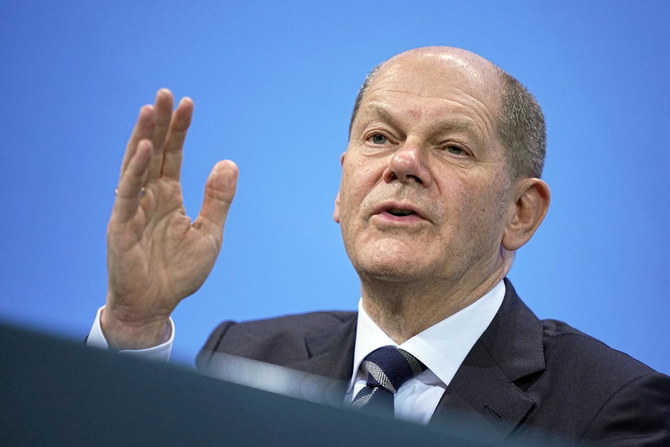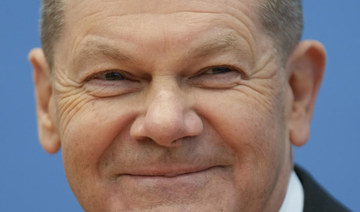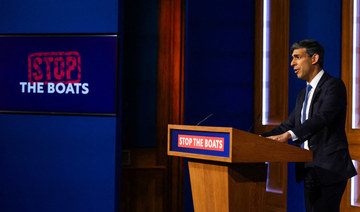BERLIN: With a pandemic crisis meeting and debut appearances in Paris and Brussels, Germany’s new Chancellor Olaf Scholz and his team hit the ground running on their first day in office Thursday.
After a ceremony-laden handover from Angela Merkel on Wednesday, Scholz sat down with regional leaders of Germany’s 16 states to discuss the coronavirus pandemic.
“We want to act quickly and decisively when it is necessary,” Scholz said after the meeting, stressing that he wanted “ensure that as many citizens as possible are vaccinated,” including with third booster doses.
With intensive care beds filling up and new variant omicron adding to fears, Scholz’s coalition of his Social Democrats, the ecologist Greens and the liberal FDP was already dragged into fighting the pandemic before being sworn in.
Underlining the “deadly serious” situation, German President Frank-Walter Steinmeier had during Wednesday’s investiture ceremony pointedly urged Scholz to “ensure that the pandemic does not keep us firmly in its grip for another year.”
Scholz, 63, has already called for Germany to follow Austria’s example and introduce mandatory jabs, pushed by Germany’s stagnating inoculation rate.
But he may have many more tough decisions to make.
Scholz “stands before a difficult chancellorship,” said the Tagesspiegel daily, noting that the pandemic was not just an epidemiological emergency but also leading to bitter divisions in society.
“Debates are being conducted in an adamant fashion, camps are being formed that are hardly building any bridges to others,” it said, noting that it “would come down to the chancellor” to resolve the bitter divides.
While fighting fires at home, Scholz also took his first step onto the world stage, taking part in a virtual Summit for Democracy organized by the United States.
Scholz is no stranger to the diplomatic circuit, having been mayor of Hamburg when the city played host to the G20 summit and also having served as finance minister in Merkel’s cabinet over the last four years.
While he has pledged continuity, international observers will be closely watching for any shifts in tone given the switch from a conservative-led government after 16 years to a center-left-led alliance.
Scholz will head to Paris on Friday for his first official visit, where he is to meet France’s President Emmanuel Macron.
He will then travel on to Brussels for talks with EU leaders and NATO chief Jens Stoltenberg.
But ahead of him, his Foreign Minister Annalena Baerbock of the Greens already made her debut appearances in both key European capitals on Thursday.
“Europe is the lynchpin for our foreign policy,” Baerbock said in a statement ahead of the visit.
“We will not seek to pursue our ideas and interests... at the cost of” Germany’s neighbors, she added.
Baerbock, who is Germany’s first woman foreign minister, has pledged to take a tougher line with authoritarian states like Russia and China after the business-driven pragmatism of Merkel’s era.
And the first signs of friction within the freshly minted government could well arise from here, as Scholz has so far taken a cautious tone on issues such as the US’ diplomatic boycott of the Winter Olympics in Beijing.
Even as Baerbock was about to embark on her trips, Scholz appeared to assert his authority over her portfolio.
Asked at a TV interview on Wednesday if Baerbock or he will determine foreign policy, Scholz said that “we will act together as a government — and that starts with the head of government.”
That may appear obvious. But as Spiegel noted, “given the differing views within the coalition, the statement is significant.”
Pandemic, diplomacy: Germany’s new government takes charge
https://arab.news/r4n6m
Pandemic, diplomacy: Germany’s new government takes charge

- Scholz sat down with regional leaders of Germany's 16 states to discuss the coronavirus pandemic
- "We want to act quickly and decisively when it is necessary," Scholz said after the meeting
Ex-Pakistan PM Imran Khan acquitted in state secrets case, but to stay in jail

- Former leader was sentenced to 10 years in prison by a lower court on charges of making public a classified cable sent to Islamabad by Pakistan’s ambassador in Washington in 2022
Khan, 71, was sentenced to 10 years in prison by a lower court on charges of making public a classified cable sent to Islamabad by Pakistan’s ambassador in Washington in 2022.
Shah Mehmood Qureshi, who was Khan’s foreign minister during his tenure from 2018-2022, was also acquitted of the charges.
“Thank God, the sentence is overturned,” a spokesman for legal affairs from Khan’s Pakistan Tehreek-e-Insaf party, Naeem Panjutha, said in a post on the X social media platform.
Despite the acquittal, Khan will remain in prison, having also been convicted in another case relating to his marriage to his third wife, Bushra Khan, contravening Islamic traditions.
UK says Rwanda asylum seekers’ deportation flights to begin on July 23

- Policy of sending asylum seekers who arrived in Britain to the East African nation is one of Rishi Sunak’s flagship policies
(Adds details in 2, 3rd paragraphs)
LONDON: The British government says it intends to begin deporting asylum seekers on July 23, court documents showed on Monday, although the controversial scheme is dependent on Prime Minister Rishi Sunak’s Conservative parties winning the upcoming election.
The policy of sending asylum seekers who arrived in Britain to the East African nation is one of Sunak’s flagship policies but legal and parliamentary obstacles have meant it has never got off the ground.
Sunak recently said the deportation flights would not leave before an election on July 4 but he has promised if he wins they would begin soon after, although he is trailing the opposition Labour Party by about 20 points in opinion polls and it has promised to scrap the plan.
In documents submitted to the London High Court as part of a charity’s challenged to the policy, government lawyers said the intention was “to effect removals with a flight to Rwanda on 23 July 2024 (and not before).”
Facing ‘systematic’ pressure to recognize Israel, Indonesia stands firm on Palestine support: FM

- Indonesia was among the first countries to recognize Palestinian statehood in 1988
- In April, Israeli media reports claimed Jakarta began OECD-brokered talks with Tel Aviv
JAKARTA: Indonesia will continue to support Palestine in the face of systematic pressure from Israel and its allies to normalize ties with Tel Aviv, Foreign Affairs Minister Retno Marsudi said on Monday.
Jakarta has no diplomatic relations with Tel Aviv and has been one of the most vocal supporters of Palestine since the beginning of Israel’s onslaught on Gaza in October. The Indonesian government has repeatedly called for an end to the occupation of Palestinian territories and for a two-state solution based on pre-1967 borders.
Speaking to university students at the Gadjah Mada University in Yogyakarta on Monday, Marsudi highlighted the “worsening situation” in the besieged enclave — where over 36,400 Palestinians have been killed — and said that Israel has been making “strategic and systematic efforts to finish off” Palestine.
“There are systematic efforts by Israel and its allies to … lobby and pressure Muslim countries to start considering opening up and normalizing ties with Israel,” she said.
In April, viral Israeli media reports claimed that Jakarta had plans to establish diplomatic ties with Tel Aviv as part of a deal to smooth Indonesia’s entry into the Organization for Economic Cooperation and Development.
But the Indonesian Ministry of Foreign Affairs swiftly rejected those claims then, saying that the world’s most populous Muslim-majority country would remain consistent in defending Palestine.
One of the staunchest supporters of Palestine, Indonesia was among the 78 countries to first recognize Palestine in 1988. It sees Palestinian statehood as mandated by the nation’s constitution, which calls for the abolition of colonialism.
Indonesia will continue its support for Palestine on the international stage, Marsudi said, including by pushing for an immediate and lasting ceasefire and urging Tel Aviv to comply with an order by the International Court of Justice to stop its military offensive in the southern Gaza city of Rafah.
Israel’s ground and air attacks have in the last eight months destroyed most of Gaza’s civilian and medical infrastructure, injuring over 82,000 people while thousands remain missing under the rubble.
The Israeli military has also blocked water, food and aid supplies to the territory, bringing its more than 2 million inhabitants to the brink of famine.
“Indonesia has consistently upheld universal principles and values to continue supporting the nation of Palestine. Consistency in embracing these principles is not easy. It’s truly not easy to keep this principle amid today’s messy world filled with pressure and promises of transactions here and there,” Marsudi said.
“But thank God that until this very moment, the Indonesian government has been able to remain steadfast and consistent in defending the nation of Palestine … We have a duty to defend justice and humanity because it is in line with the mandate of our 1945 constitution.”
Indian Islamic center warns Muslims against felling trees

- Much of northern India has been gripped by a deadly heatwave with temperatures above 45° Celsius
LUCKNOW: One of India’s most influential Islamic centers has warned Muslims not to chop down trees or burn fields after harvesting to help stem climate change and surging temperatures.
Much of northern India has been gripped by a deadly heatwave with temperatures above 45° Celsius (113 degrees Fahrenheit), killing scores of people by heatstroke.
“Every Muslim must ensure no green trees and crops are set on fire,” Khalid Rasheed Farangi Mahal, chair of the Islamic Centre of India, said.
Mahal, a top scholar in the northern city of Lucknow, issued the non-binding fatwa or ruling on Sunday, saying that the religious duty of Muslims to conserve greenery and water was “stated in the Qur’an”.
“Burning trees and crops is forbidden in Islam and is considered a grave sin,” read the fatwa, published in Urdu and Hindi.
He also urged Islamic clerics to encourage stewardship of the environment during their sermons – telling people to take care of the trees around them.
“Instead of merely planting a sapling symbolically, it is more meaningful to take care of existing plants and trees,” he said, urging Muslims to prevent pollution of waterways and the sea.
Last week, an Indian court urged the government to declare a national emergency over the country’s ongoing heatwave, saying that hundreds of people had died during weeks of extreme weather.
The High Court in the western state of Rajasthan, which has suffered some of the hottest weather, said authorities had failed to take appropriate steps to protect the public from the heat.
India is no stranger to searing summer temperatures but years of scientific research have found climate change is causing heatwaves to become longer, more frequent and more intense.
Researchers say human-induced climate change has driven the devastating heat impact in India and should be taken as a warning.
Russia warns US against ‘fatal’ miscalculation in Ukraine

- Putin said the West would be directly involved in any use of its weapons by Ukraine to strike deep inside Russia
MOSCOW: Russian Deputy Foreign Minister Sergei Ryabkov said on Monday the United States could face “fatal consequences” if it ignored Moscow’s warnings not to let Ukraine use weapons provided by Washington to strike targets inside Russia.
Ryabkov was commenting on President Joe Biden’s decision last week to approve the use of US-supplied weapons to hit targets inside Russia that were involved in attacks on Ukraine’s Kharkiv region.
“I would like to warn American leaders against miscalculations that could have fatal consequences. For unknown reasons, they underestimate the seriousness of the rebuff they may receive,” state news agency RIA quoted Ryabkov as saying.
He referred to comments last week by President Vladimir Putin, who said NATO countries were playing with fire and risking a deeper global conflict — one of a series of warnings from Moscow about the risk of a serious escalation.
“I urge these figures (in the US) ... to spend some of their time, which they apparently spend on some kind of video games, judging by the lightness of their approach, on studying what was said in detail by Putin,” Ryabkov said.
Putin had delivered “a very significant warning and it must be taken with the utmost seriousness”, he added.
Putin said the West would be directly involved in any use of its weapons by Ukraine to strike deep inside Russia, because such attacks would require its satellite, intelligence and military help.
NATO Secretary General Jens Stoltenberg said last week that NATO had the right to help Ukraine uphold its own right to self-defense, and this did not make NATO a party to the conflict.
Ukrainian President Volodymyr Zelensky said at the weekend that Kyiv was grateful to Washington for allowing it to use US-supplied HIMARS rocket systems in the Kharkiv region, but this was not enough. Ukraine has long argued that restrictions on the way it can use Western-supplied weapons are seriously limiting its ability to defend itself.
Russian news agencies quoted Ryabkov as saying that attempts by Kyiv to attack Russian early-warning radar systems would be thwarted and Moscow may respond asymmetrically to such steps.
A Kyiv intelligence source said last week that a Ukrainian drone had targeted a long-range radar deep inside Russia that is part of Russia’s early-warning system to detect whether it is under nuclear attack.


















